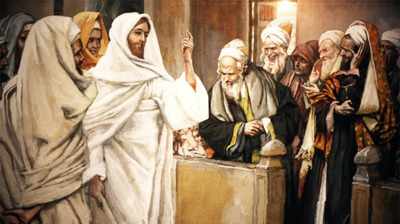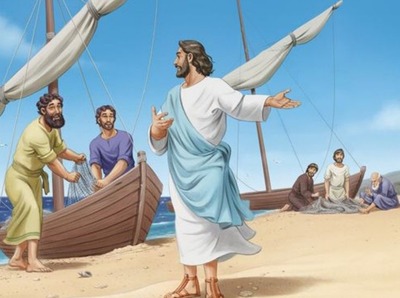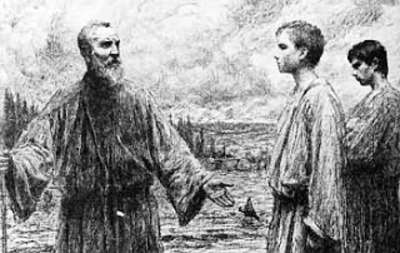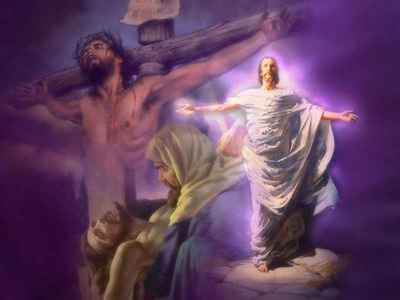June 25, 2023
|by N W
|
0 Comments
|
Commitment, Courage, Deacon Mark, Faith, Forgiveness, Obedience, Saints, Strength, Trust
Twelfth Sunday in Ordinary Time
June 25, 2023 — Year A
Readings: Jer 20:10-13 / Ps 69 / Rom 5:12-15 / Mt 10:26-33
by Rev. Mr. Mark De La Hunt, Permanent Deacon
In case you missed it, on June 16 we celebrated the Solemnity of the Most Sacred Heart of Jesus and the day after that, the Memorial of the Immaculate Heart of Mary. This past Thursday we celebrated the Memorial of St. Thomas More, and just yesterday, the Solemnity of the Nativity of John the Baptist. I see in that sequence of celebrations the love of Jesus’ Sacred Heart burning in Mary’s, Thomas More’s, and John’s hearts, enabling their great victories. We receive His Sacred Heart at every Mass in the Eucharist! Keep this truth and these spiritual heroes in mind during this homily on trusting in God’s grace when the world persecutes us for witnessing to His truth and love.
The LA Dodgers major league baseball organization recently held a public event in their stadium to give a “Community Hero Award” to a group of men who dress as nuns and mock the Catholic Church, which is to say they mock Christ (CNA). Now pray today’s Psalm 69 again, “For your sake I bear insult…I have become an outcast to my brothers…the insults of those who blaspheme you fall upon me.”
Washington Nationals pitcher and Catholic, Trevor Williams, responded to the Dodgers’ celebration of mockery by becoming the first major league player to denounce the Dodgers’ award ceremony for an organization the U.S. Conference of Catholic Bishops has called “blasphemous (CNA).” His Twitter comments denouncing this attack on the Catholic faith have been retweeted thousands of times. He has been criticized, yes, but Williams said he wanted to show his four children that if they are ever tested, it is ok to stand up for their faith. By the way, Trevor’s own faith took off after going to Adoration as a teenager.
In today’s first reading, the prophet Jeremiah is lamenting how those “who WERE [his] friends” denounce him, watching for “any misstep” so they can trap and “take vengeance on him (Jer 20:10).” However, Jeremiah doesn’t worry about being “canceled” for his faith in God. He defiantly writes, “But the Lord is with me, like a mighty champion: my persecutors will stumble, they will not triumph. In their failure they will be put to utter shame, to lasting, unforgettable confusion. (Jer 20:11-13)!”
St. Thomas More can relate to Jeremiah’s lamenting about friends turning on him. More was King Henry VIII’s chancellor, and the King wanted More to sanction his illegitimate second marriage in addition to his self-proclaimed position of head of the Catholic Church in England. More refused to sanction either, and King Henry VIII began to cancel More’s job, his status, money, and reputation. But More’s faith did not break. The King was frustrated and finally ordered More’s beheading.
More’s last words exemplify Jesus’ exhortation in today’s gospel. Jesus said, “Do not be afraid of those who kill the body but cannot kill the soul; rather be afraid of the one who can destroy both soul and body in Gehenna (Mt 10:28).” Likewise, More said, “I die his majesty’s good servant, but God’s first.” This is called holy fear, which Bishop Barron describes as fearing “losing intimacy and friendship with God (Barron 72).”
St. Paul, in the second reading, wrote to the Roman Church, “But the gift is not like the transgression. For if by the transgression of the one the many died, how much more did the grace of God and the gracious gift of the one man Jesus Christ overflow for the many.” Living the hope of these words in prison before his execution, Thomas More wrote, “His grace has strengthened me until now and made me content to lose goods, land, and life as well, rather than to swear against my conscience.” In doing so, More also echoed today’s Psalm “See, you lowly ones, and be glad; you who seek God, may your hearts revive! For the Lord hears the poor, and his own who are in bonds he spurns not (Ps 69:33).”
Like the baseball player Trevor Williams, More also wanted to teach his child through his actions. In his letter from prison to his daughter, Margaret he wrote, “Do not let your mind be troubled over anything that shall happen to me in this world. Nothing can come but what God wills. And I am very sure that whatever that be, however bad it may seem, it shall indeed be the best.”
What of the people who mock the Church and try to teach our children to do the same? Jeremiah called the mockers “evildoers” and spoke of God “putting them to shame.” These strong words can be difficult for us, because as Christ’s followers, we look at our persecutors like the first deacon, Stephen. As he was being stoned to death for sharing his faith, he said in imitation of Jesus on the Cross, “Lord, do not hold this sin against them.”
When we read the Bible, it is important that we read it in light of the gospels which rightly order our thoughts. To better understand this difficult challenge, it is illuminating to look at Jeremiah’s words through the lens of today’s gospel reading. Jesus said to the Twelve: “Fear no one…And do not be afraid of those who kill the body but cannot kill the soul (Mt 10:28).” What is Jesus doing here? He is, in His perfect love, “casting out all fear (Jn 4:18)!!” What causes the cycle of accusations, mockery, and violence? Fear. However, if my heart is fed by and enfolded in the Sacred Heart of Jesus, then I fear no one, nowhere. Free from fear, I can respond with Christ’s love and break the chains of conflict and discord. I can even pray for God to forgive those men mocking our Lord, “to not hold their sin against them.”
Sound unreasonable or naive? Thomas More, like all the great saints, shows us the way. In his letter to Margaret, he did not mock Henry VIII, nor point out his sin of adultery. He, with an eye on eternity instead of the here and now, wrote this about Henry: “His Majesty has done me such great good with respect to spiritual profit that I trust that among all the great benefits he has heaped so abundantly upon me I count my imprisonment the very greatest.” Like the bold hymn, Faith of our Fathers, More was “chained in prison dark, but was still in heart and conscience free.”
Is there no justice or accountability, then, for those who persecute and mock us? Do we just let them walk all over us? A wise priest once told an angry man, “You cannot do worse to that person than God will.” Jesus said, “Everyone who acknowledges me before others I will acknowledge before my heavenly Father. But whoever denies me before others, I will deny before my heavenly Father (Mt 10:33).” That is a polite way of saying not everyone goes to heaven. God commands us to forgive our enemies. Justice is His domain.
Do not be afraid to speak the truth. Remember that there is no love without it. It is a spiritual oxymoron to say I want someone to be happy while suppressing the truth when I am with them. Could speaking the truth cause me pain and suffering? Yes. No doubt some of you have experienced this in your own families and at work and school. So, I ask myself a question: Do I fear the Lord who can cast body and soul into Gehenna, as much as I fear acknowledging Him when it might cause me discomfort? We must keep an eternal perspective of our life. Psalm 85 says, “Salvation is near for those who fear Him.” But take heart! God does not abandon us when we testify to His truth, love, and good news. Remember Jeremiah’s words, “My persecutors will stumble; they will not triumph.”
We see this truth in the rest of the story of the heroes we just heard about. Trevor Williams says many players and stadium employees have secretly thanked him. And on the Solemnity of the Sacred Heart, Trevor Williams was given the honor of leading the Litany of the Sacred Heart of Jesus for tens of thousands on the Hallow app. As for the British Catholic Church, seemingly taken over by Henry VIII, it is now the leading religion in Thomas More’s beloved London. John the Baptist was beheaded, but Jesus called him the greatest born of woman, and the Church honors his birth two thousand years later with its highest-ranking feast, a Solemnity!
And what about our awesome mother, Mary? She stayed at her son’s side, throughout His persecution and Crucifixion, despite extraordinary personal pain, her Immaculate Heart enfolded in His Sacred Heart. For her fidelity was she abandoned by God to poverty and loneliness with no husband and no son? No. Jesus, with one of His last seven utterances on the Cross, gave her a new son who went on to write of her victorious coronation as Queen of Heaven (Rev 12:1).
Let’s close with God’s word, which gives us hope and helps us to be bold in the Spirit despite our failings, inadequacies, and fears. The next time you need to proclaim His truth “from the housetops,” remember these words exchanged between Jesus and St. Paul. Jesus said to Paul, “My grace is sufficient for you, for power is made perfect in weakness.” And Paul responded, “Therefore, I am content with weaknesses, insults, hardships, persecutions, and constraints, for the sake of Christ; for when I am weak, then I am strong (2 Cor 12:9-10).” Amen.
Citations
Bishop Robert Barron. The Word on Fire Bible-The Gospels. Word on Fire Ministries 2020.
Filip Mazurczak. Is a re-Catholicization of Britain underway? The Catholic World Report, July 14, 2020.
Peter Pinedo. Washington Nationals pitcher Trevor Williams speaks out on Dodgers controversy. Catholic News Agency (CNA), June 14, 2023.
KEEP READING
 540-586-8988
540-586-8988 










